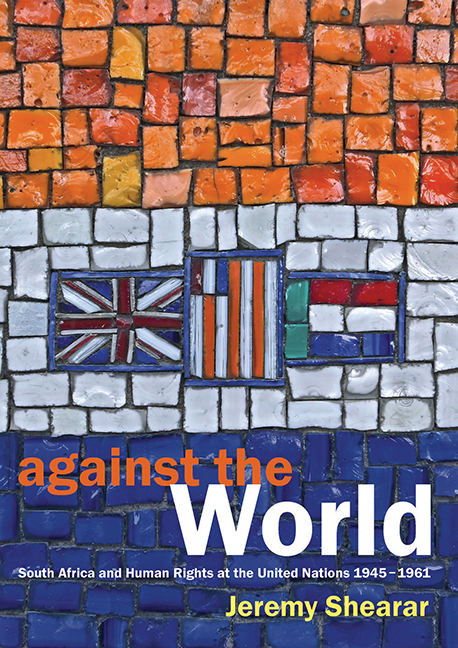Book contents
- Frontmatter
- Contents
- Acknowledgements
- Abbreviations
- Introduction: ‘What we have lost is all the more reason for cherishing what survives’
- 1 Quod severis metes: Birth of the United Nations
- Chapter 2 South African Indians
- 3 Universal Declaration of Human Rights
- 4 International covenants on human rights
- 5 United Nations surveys of human rights issues
- 6 Evolution of human rights at the United Nations
- 7 State sovereignty at issue
- 8 Apartheid on the agenda
- 9 Shadow of Sharpeville
- 10 General relations with the United Nations
- 11 Concluding observations
- Appendix: Selected provisions of the United Nations Charter
- Sources and references
- Index
8 - Apartheid on the agenda
Published online by Cambridge University Press: 19 March 2020
- Frontmatter
- Contents
- Acknowledgements
- Abbreviations
- Introduction: ‘What we have lost is all the more reason for cherishing what survives’
- 1 Quod severis metes: Birth of the United Nations
- Chapter 2 South African Indians
- 3 Universal Declaration of Human Rights
- 4 International covenants on human rights
- 5 United Nations surveys of human rights issues
- 6 Evolution of human rights at the United Nations
- 7 State sovereignty at issue
- 8 Apartheid on the agenda
- 9 Shadow of Sharpeville
- 10 General relations with the United Nations
- 11 Concluding observations
- Appendix: Selected provisions of the United Nations Charter
- Sources and references
- Index
Summary
Apartheid first inscribed on the General Assembly agenda
The UN Department of Public Information dated the organisation's consideration of SA's racial policies from India's letter of 16 July 1948 to the Secretary-General requesting him to include the Indian question on the provisional agenda of the 3rd GA. That request stated: ‘The present Government in the Union of South Africa stands committed to the policy of “apartheid”, or racial segregation, and the domination of all non-White peoples by the Europeans’. The years from 1946 to 1952 constituted a period of consensus building at the UN, with increasing references to the general domestic policies of the Union government to buttress the Indian complaint.
The SA permanent representative, G.P. Jooste, noted these developments in his report to the Prime Minister after leading the SA delegation to the 4th GA. The UN, he wrote, had adopted a strong line over human rights, to the extent of ignoring domestic jurisdiction: ‘En aangesien die handhawing van menseregte geheel-en-al bepaal word deur die verhouding tussen die staat en sy burger, is die toeëiening van bevoegdheid in hierdie verband deur die Organisasie een van die mees onheilspellende ontwikkelings in die V.V.O.’ The implications, Jooste said, were most ominous for SA, where a white minority held power. As the whites would not share power, they created a permanent inequality, which made them the target of venomous criticism and poisoned SA's foreign relations. The term ‘apartheid’ had acquired overtones internationally, which the Union's critics could misuse to great effect. SA government propaganda was totally ineffective.
In January 1952, Malan made a strong attack on the UN during the censure debate at the opening of Parliament. His remarks were based on a resolution he had received from the ANC, calling for absolute equality between the races and an end to the colour bar. The ANC had said it relied on friends abroad, namely the UN. Malan accused the UN of casting aside its ‘manifesto’ that prevented it from interfering in domestic affairs. It was concerned, he said, only with the well being of the non-whites.
A month before the 7th GA, India, together with 12 Middle East and Asian states, asked the Secretary-General to include a supplementary item in the agenda: ‘The question of race conflict in South Africa resulting from the policies of apartheid of the Government of the Union of South Africa’.
- Type
- Chapter
- Information
- Against the WorldSouth Africa and Human Rights at the United Nations 1945–1961, pp. 166 - 197Publisher: University of South AfricaPrint publication year: 2017



